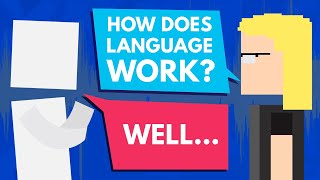Beep Boop Bop, Zero Zero One Zero One. Oh, my bad. I meant to say "Hey there, welcome to Life Noggin."
哔哔哔哔,零零一零一。哦,我的错。我想说“嗨,欢迎来到大脑洞开的生命奇想。”
Isn't it awesome that you can hear, see, and feel words and get an understanding of what someone is trying to tell you!
你能听到,看到,感觉到词语,理解别人想要告诉你的事情,这不是很棒吗?
I love words, especially ones like soliloquy, kumquat, Ronkonkoma.
我喜欢词语,尤其是“独白”、“金桔”、“龙孔科马”这些词语。
Words are just a part of this wonderful thing called language and I'm super curious where language comes from in the brain!
单词只是语言这个奇妙事物的一部分,我非常好奇语言从何而来!
We're gonna find out with the help of my good friend Reina Scully. Hello! First off, what is language?
我好朋友瑞娜·史高丽会帮我们找到答案。你好!首先,什么是语言?

Language is the expression of human communication through which things like beliefs, behaviors, and knowledge can be shared, explained, or experienced.
语言是人类交流的一种表达方式,通过语言,想法、行为和知识可以被共享、解释或体验。
It's based on a system of conventionally used signs, sounds, gesture, or marks that can convey meaning within some sort of group or community.
它基于一套常用的符号、声音、手势或标记系统,这些可以在某种组织或群体中传递意义。
As such, language is a little different from speech, which is more simply just a verbal means of communication.
因此,语言与言语有一点不同,言语只是一种口头的交流方式。
But where does language come from in the brain? To help us figure it out, let's look at what happens when you hear a word and want to say it yourself.
但是语言从何而来呢?为了帮助理解,我们看看当你听到一个单词并想要自己说出来时会发生什么。
Generally, to speak the heard word, the information must first get to your primary auditory cortex.
一般来说,要说出听到的单词,信息必须首先进入你的初级听觉皮层。
Your posterior speech area comes into play, including the Wernicke's area, which we'll talk about more later.
你的后语言区开始起作用了,包括韦尼克区,我们稍后会谈到它。
The information travels to the Broca's area and eventually ends up in your motor cortex so you can say the word yourself.
这些信息会进入布洛卡区,最终进入你的运动皮层,这样你就能自己说出这个词了。
It's similar for speaking a word that you read, but your primary visual cortex is involved.
这与你看到一个单词再说出来相似,不过参与其中的是你的初级视觉皮层。
Wernicke's area seems to be super important to your comprehension of sounds and language, as damage to it can lead to something called Wernicke's aphasia, where a person can lose the ability to understand language.
韦尼克区对你理解声音和语言似乎非常重要,因为它的损伤可能导致韦尼克失语症,得这种病的人可能会失去理解语言的能力。
They can often still speak clearly, but what they say is often confusing and empty of content. This is typically referred to as "word salad".
他们通常仍能清晰地表达,但他们所说的往往令人费解,内容空洞。这通常被称为“语词沙拉”。
Broca's area seems important to language as well, but more so on the end of generating articulate speech.
布罗卡氏区对语言似乎也很重要,在产生清晰的言语时更重要。
When it's damaged, it can lead to Broca's aphasia, which can make it harder for a person to speak.
这个区域受损时,会导致布罗卡失语症,这可能使人说话有困难。
They can typically still comprehend language, but have difficulty replying in ways that are coherent or grammatically correct.
他们通常仍能理解语言,但回复却很不连贯或者不符合语法。
Beyond these parts of the brain, language might also have something to do with a gene called FOXP2.
除了大脑的这些部分,语言也可能与一种叫FOXP2的基因有关。
This gene appears to be essential for the development of the speech and language regions in your brain and it seems to influence language development.
这种基因似乎对大脑中语言区域的发育至关重要,它似乎会影响语言能力的发育。
Mutations in this gene can even lead to language and speech disorders. And to all my bilingual friends out there, I've got some pretty cool news for you.
这种基因的突变甚至会导致语言和言语障碍。我所有通晓双语的朋友们,我有一个很酷的消息要告诉你们。
A recent study found that language shapes how the brain perceives time and that people who can speak two languages fluently can think about time differently depending on the language context.
最近的一项研究发现,语言塑造了大脑对时间的感知方式,能流利地说两种语言的人可以根据不同的语言环境以不同的方式思考时间。
It's evidence on how language can creep into our senses!
这是语言如何潜入我们感官的证据。
What language you speak might also have an impact on what's going on inside your brain.
你所说的语言可能也会对你大脑里发生的事情产生影响。
For instance, some believe that speakers of Japanese think differently than other languages particularly more western ones.
例如,一些人认为说日语的人的思维方式与其他语言不同,尤其是较为西方的语言。
However, if true, it seems a little unclear if the potential differences are due to the languages themselves or morso due to culture.
然而,如果这是真的,那么这些潜在的差异是由于语言本身还是文化的原因,这就有点不清楚了。
It sure is interesting how many different languages there are in the world! Let me know the ones you know down in the comments section below!
世界上有这么多不同的语言,真是太有趣了!请在下面的评论部分告诉我你懂哪种语言!
Bonus points: if you can speak robot, or Japanese, Make sure you check out Reina's channel on YouTube!
加分点:如果你会说机器人,或者日语,一定要去YouTube上看看雷纳的频道!
Not only is she an amazing friend of mine but she makes incredible videos about Japanese culture and all the events going on in her life.
她不仅是我的好朋友,她还制作了很多关于日本文化的视频,还会有她生活中发生的事情。
So if you wanna watch more, check out Reina's channel, and tell her Blocko sent you!
所以如果你想看更多视频的话,去看看雷纳的频道,告诉她宝高让你来的!
As always, my name is Blocko. This has been Life Noggin. Don't forget to keep on thinking!












